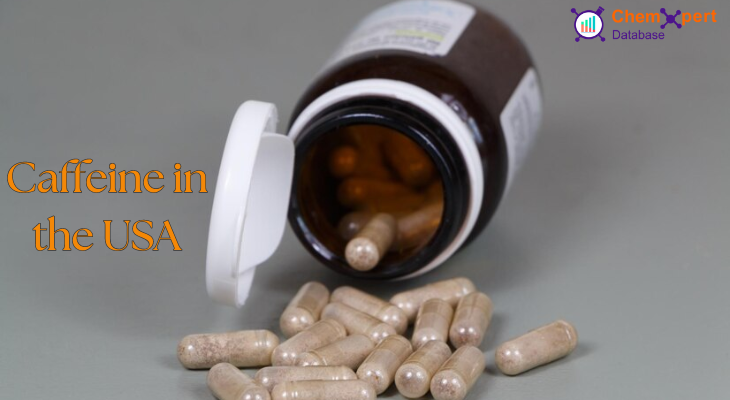
Caffeine is a familiar friend whose usefulness can hardly be overestimated, it is taken in the morning and during working hours to prevent the sense of fatigue. This psychoactive stimulant used in drinks as coffee, tea, energy drinks and in various dietary supplements has attracted consumers worldwide. It is a complex compound, which has a multi-faceted role in our daily lives, that is why caffeine an indispensable part of our diets and a major component in the global economy. In this blog, we look at the basic details about caffeine including its chemical properties, the growth in global market size over the years and the current rules governing it in the United States.
Caffeine serve as one of the most popular psychoactive substances consumed in the form of coffee, tea, energies drinks and dietary & nutritional supplements. The fame comes from its stimulating action with which it assists in the elimination of feelings of tiredness. We explore the component and properties of caffeine, the global market size, and the regulations around caffeine in the USA.
Caffeine with its IUPAC name 1,3,7-trimethylpurine-2,6-dione has chemical formula C8H10N4O2 with molecular mass 194.19 g/mol. Its structure consists of two fused rings: an aromatic nitrogen-containing ring, a pyrimidinedione and an imidazole ring having a middle chain of three carbon atoms. The arrangement of these carbon, hydrogen, nitrogen and oxygen atoms provide the specialty to caffeine.
Since caffeine is solid and crystalline in structure it appears as a white crystalline material which is bitter in taste and odorless. Soluble in water and organic solvents which include: Chloroform and ethyl acetate. Caffeine can be purified by recrystallization because of its relatively high melting point of 235-238°C and a relatively low boiling point of 178°C at 4 mmHg. Caffeine itself is CNS stimulant that works by inhibiting the receptors responsible for causing drowsiness.
At present, interest in caffeine and its derivatives is constantly increasing, and the international market for it is growing rapidly. The global market size was valued at USD 710 million in 2021 and is estimated to expand to approximately USD 1 billion by 2031, with significant growth. The market mainly comprises the United States, because American consumers are accustomed to drinking coffee, energy, and other caffeinated drinks and supplements.
The categories of caffeine market are as follows:
Caffeine is regulated in the United States by the Food and Drug Administration, or FDA. The FDA recognizes caffeine as a dietary ingredient, the use of caffeine in products falls under the Dietary Supplement Health and Education Act of 1994. Here are some key regulations:
The Chemxpert Database plays a vital role in providing comprehensive information about caffeine. It offers detailed chemical properties, market data, regulatory guidelines, and a directory of suppliers and manufacturers. Chemxpert also includes quality and purity standards, scientific research, and publication access, ensuring researchers, manufacturers, and industry professionals have all the necessary information to make informed decisions and maintain compliance with industry standards. Whether you're looking to understand caffeine's characteristics or navigate regulatory requirements, Chemxpert is your go-to resource.
Chemxpert Database is very useful and relevant in offering info about caffeine which is important in our day to day life. It offers information on chemical properties of products, its market and industry overview, regulatory requirements & resources, and supplier & manufacturer data. Chemxpert also provides access to various material to help the researchers, manufacturers and industries to make the right decision and meet the standards of the Chemical Industry. If you are interested in knowing more about caffeine and its properties or if you need help in finding specific category and chemical database,Chemxpert is the place to look.
Caffeine, one of the most commonly used psychoactive substance in different population groups; it helps to reduce sleepiness and increase wakefulness. Knowledge of its chemistry, markets for supply and demand and legal requirements governing its use are critical for manufacturers of beverages and diet supplemental products. Caffeine consumption has lately become an important issue in public health and therefore, manufacturers should take responsibility and be transparent. Sources such as Chemxpert Database can be highly helpful for the industry expert for gaining deeper understanding regarding the properties, trend, and legal requirement of caffeine so that one can easily work and decision making in this dynamic field.

Sick and tired of always wondering if you are being asked to pay the right price for your APIs? This empowers you with the answers you need to make the right decisions in the Global API market.
Chemxpert Database is one of the biggest and most comprehensive directories of pharma and chemicals, manufacturers, suppliers and information. Provided with current information on prices, demand and transactions, it gives you instant feedback on whether you are buying what is right and at the right time.
Start using market intelligence today and allow yourself to be in control in the API market.
Check it out today and make more informed sourcing decisions! Learn More!